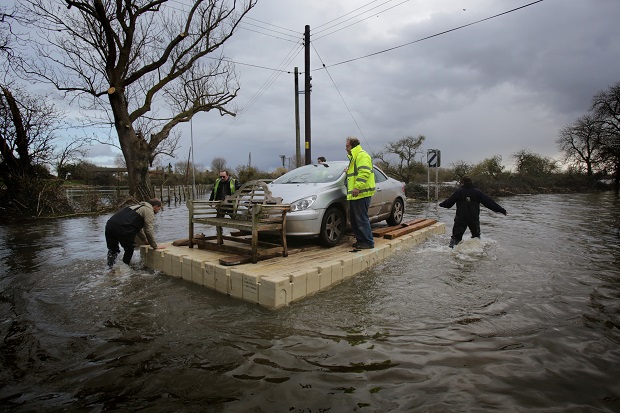The Shadow Environment Secretary Maria Eagle headed off to Woking today, where she addressed an audience of environmentalists at WWF’s swanky new headquarters.
Her speech, which was widely trailed, was full of silly season fare, and her superficial understanding of the climate debate shines through. Take this for example:
‘The Met Office, the Committee on Climate Change and the overwhelming majority of the scientific community all tell us that last winter’s floods are consistent with the projected consequences of climate change.’
‘Consistent with’ is one of those gloriously weasel phrases that the more disreputable kind of climate scientist likes to use when speaking to politicians. Yes of course the floods were consistent with the projected consequences of climate change. They were also consistent with no global warming, with global cooling and with climate change being caused by green men from Mars. As the Met Office noted in the aftermath, the floods were caused by a shift in the jet stream, something that happens from time to time and which has no known link to global warming.
Then there’s this:
‘We know that the climate is changing. We know that human activity is contributing to that change. I think that this is the biggest challenge facing the world today.
‘The stability of our climate system provides the basic underpinning for all human life and animal life and plant life… Small shifts in global temperature will cause massive impacts for millions of people. This isn’t speculation or the sci-fi musings of an imaginative, bestselling author. It is solid, established scientific fact, accepted by 97% of the scientists who study our climate systems.’
Reasonable people can agree that the climate is changing. Nowhere in our records of climate history do we find evidence of stability. There is only constant change; sometimes slow, sometimes sudden. Similarly, we can agree that human activity contributes to that change: mankind has affected the climate since he started clearing forests with stone axes. But seen from this perspective, it’s much harder to support the idea that climate change is the ‘biggest challenge facing the world today’, and harder still to support the idea that the stability of the climate system underpins human life, simply because, as we have seen, the climate is not stable at all. But even these ideas are not as bad as the suggestion that 97 per cent of scientists believe that ‘small shifts in global temperature will cause massive impacts for millions of people’. Contrary to what Eagle says, ‘speculation and sci-fi musings’ is precisely what it is. There is simply no scientific study showing any such thing.
The headlines, however, have concentrated on Eagle’s allegation that there will be 330,000 more homes at risk of flooding by 2035 because of government policy. Her case, such as it is, is larded with a great deal of innuendo, implying that it’s all down to a failure to tackle climate change; but, if you analyse her words you discover that this is all just window dressing. She is actually focusing on two standard Labour party themes: spending cuts, particularly in the area of flood defence, and evil Conservatives, in particular Owen Paterson.
Paterson is well used to being on the receiving end of pot-shots from environmentalists. Being suspected of harbouring impure thoughts on green issues, he has become a target for the greens and politicians in every party who want their votes. One assumes, though, that he must get tired of his opponents being quite so dishonest about him. Paterson has stated quite clearly that he believes that mankind has an influence on the climate — almost everybody in the climate debate does. Eagle’s accusation that he is a ‘denier’ therefore says much more about her than it does about him.
As to Eagle’s alleged cuts to flood defence works, whether these are real or whether they will have the effect that she says they will is anybody’s guess. Her sources are obscure and the numbers are disputed. What is clear is that climate change in the next two decades will make little difference to flood risk, which is driven mostly by politicians preventing building in areas where there is no flood risk and allowing it on flood plains. The impact of climate change policy will be even less.
Andrew Montford is the author of ‘The Hockey Stick Illusion’.






Comments